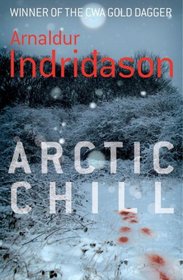This was good in the way that all of Indriadson's mysteries are good, but the translation was disappointing. It looks like the regular translator died before this was done, and it shows. Parts of it just seem flat and redundant. There were also a lot of typos and misspellings.
Helpful Score: 1
Ragnarök in Reykjavik, June 19, 2013 By Dr. Frank Stech
In Norse mythology, Ragnarök is the future of events, a saga of a great battle, the deaths of heroes and villains, natural disasters, then the world drowned in watery chaos. Arnaldur Indridason's "Arctic Chill" is the Reykjavik mini-Ragnarök, ending with Iceland encased in ice: "The frost tightened its grip as evening fell, whipped up by the chill Arctic wind that blasted in from the sea and south over the desolate winter landscape. ... The wind howled and shrieked between the buildings and down the empty streets. The city lay lifeless, as if in the grip of a plague."
This fifth of Indridason's Reykjavik murder mysteries begins with Inspector Erlendur and Detectives Elínborg and Sigurdur Óli peering down at the stabbed and bled out body of an lovely immigrant boy from Thailand, frozen into the January ice. "The ground was now covered in a solid coating of ice and the north wind howled and sang around the blocks of flats. Rippling sheets of snow swept along the ground. They collected into little drifts here and there and fine powder snow swirled away from them. Straight from the Arctic, the wind bit their faces and penetrated their clothes, cutting to the bone." The case is as bleak as the opening scene.
As they trail the killers, the Reykjavik murder squad finds more crime, hatred, racism, evil, and man's inhumanity to man, never a pattern, always more evidence of the swirling chaos of Ragnarök's icy future. "'We did it for them,' she said in a low voice. 'For our boys. What they did could never be undone, disgusting and horrible though it was. We had to think of the future. We had to think of their future.' 'But there was no future, was there?' Erlendur said. 'Only this dreadful crime.'"
Inspector Erlendur and his comrades doggedly plow through the snow and ice, finding the clues and trying to understand them, encountering more senseless violence and death. They piece together the answers to the murder mysteries, but in the end, find none to the greater mystery: "Erlendur stood over the grave in the freezing cold, searching for a purpose to the whole business of life and death. As usual he could find no answers. There were no final answers to explain the life-long solitude of the person in the urn, or the death of his brother all those years ago, or why Erlendur was the way he was, and why Elías was stabbed to death. Life was a random mass of unforeseeable coincidences that governed men's fates like a storm that strikes without warning, causing injury and death."
There is nothing warm or cheering in Arnaldur Indridason's "Arctic Chill;" we are in the hands of a hard-hearted and cold-blooded master singer of modern Norse sagas, warning us of murder, evil, and chaos.
In Norse mythology, Ragnarök is the future of events, a saga of a great battle, the deaths of heroes and villains, natural disasters, then the world drowned in watery chaos. Arnaldur Indridason's "Arctic Chill" is the Reykjavik mini-Ragnarök, ending with Iceland encased in ice: "The frost tightened its grip as evening fell, whipped up by the chill Arctic wind that blasted in from the sea and south over the desolate winter landscape. ... The wind howled and shrieked between the buildings and down the empty streets. The city lay lifeless, as if in the grip of a plague."
This fifth of Indridason's Reykjavik murder mysteries begins with Inspector Erlendur and Detectives Elínborg and Sigurdur Óli peering down at the stabbed and bled out body of an lovely immigrant boy from Thailand, frozen into the January ice. "The ground was now covered in a solid coating of ice and the north wind howled and sang around the blocks of flats. Rippling sheets of snow swept along the ground. They collected into little drifts here and there and fine powder snow swirled away from them. Straight from the Arctic, the wind bit their faces and penetrated their clothes, cutting to the bone." The case is as bleak as the opening scene.
As they trail the killers, the Reykjavik murder squad finds more crime, hatred, racism, evil, and man's inhumanity to man, never a pattern, always more evidence of the swirling chaos of Ragnarök's icy future. "'We did it for them,' she said in a low voice. 'For our boys. What they did could never be undone, disgusting and horrible though it was. We had to think of the future. We had to think of their future.' 'But there was no future, was there?' Erlendur said. 'Only this dreadful crime.'"
Inspector Erlendur and his comrades doggedly plow through the snow and ice, finding the clues and trying to understand them, encountering more senseless violence and death. They piece together the answers to the murder mysteries, but in the end, find none to the greater mystery: "Erlendur stood over the grave in the freezing cold, searching for a purpose to the whole business of life and death. As usual he could find no answers. There were no final answers to explain the life-long solitude of the person in the urn, or the death of his brother all those years ago, or why Erlendur was the way he was, and why Elías was stabbed to death. Life was a random mass of unforeseeable coincidences that governed men's fates like a storm that strikes without warning, causing injury and death."
There is nothing warm or cheering in Arnaldur Indridason's "Arctic Chill;" we are in the hands of a hard-hearted and cold-blooded master singer of modern Norse sagas, warning us of murder, evil, and chaos.




